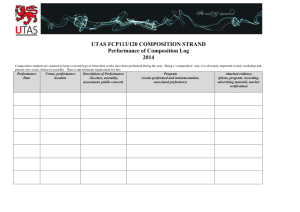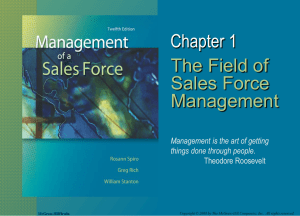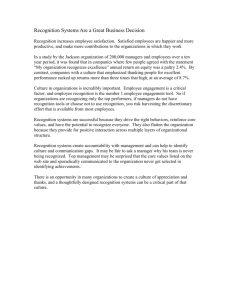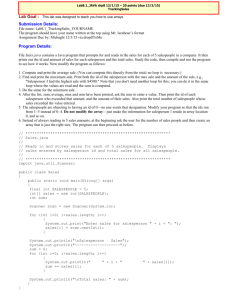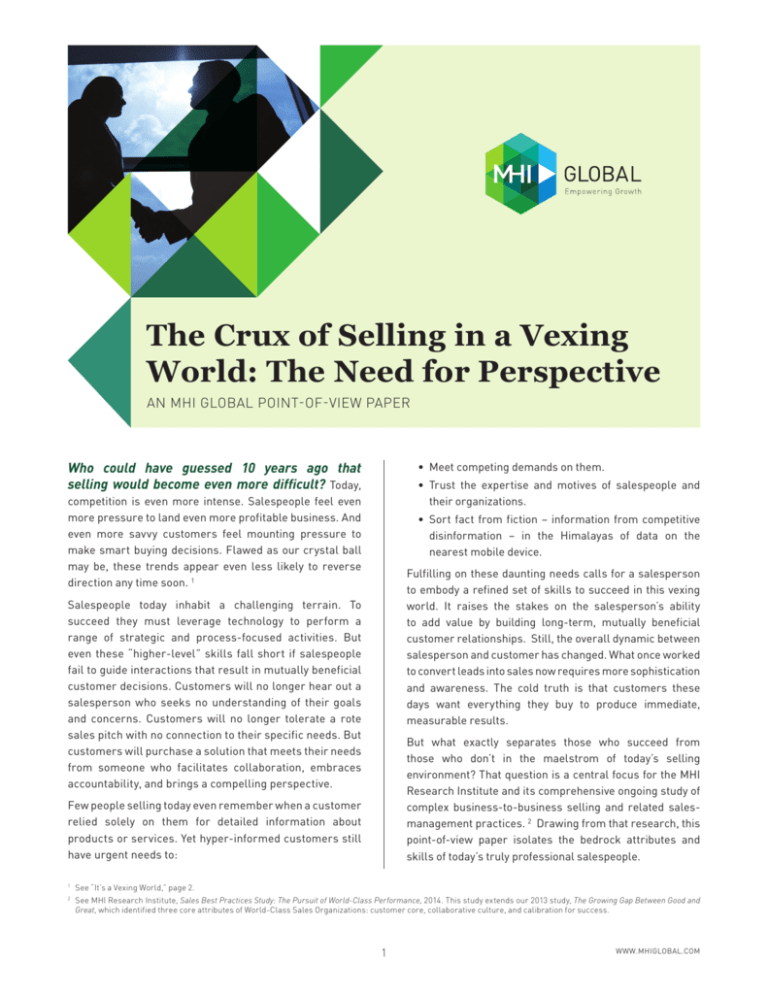
The Crux of Selling in a Vexing
World: The Need for Perspective
AN MHI GLOBAL POINT-OF-VIEW PAPER
Who could have guessed 10 years ago that
selling would become even more difficult? Today,
• Meet competing demands on them.
•Trust the expertise and motives of salespeople and
their organizations.
competition is even more intense. Salespeople feel even
more pressure to land even more profitable business. And
even more savvy customers feel mounting pressure to
make smart buying decisions. Flawed as our crystal ball
may be, these trends appear even less likely to reverse
direction any time soon. 1
• Sort fact from fiction – information from competitive
disinformation – in the Himalayas of data on the
nearest mobile device.
Fulfilling on these daunting needs calls for a salesperson
to embody a refined set of skills to succeed in this vexing
world. It raises the stakes on the salesperson’s ability
to add value by building long-term, mutually beneficial
customer relationships. Still, the overall dynamic between
salesperson and customer has changed. What once worked
to convert leads into sales now requires more sophistication
and awareness. The cold truth is that customers these
days want everything they buy to produce immediate,
measurable results.
Salespeople today inhabit a challenging terrain. To
succeed they must leverage technology to perform a
range of strategic and process-focused activities. But
even these “higher-level” skills fall short if salespeople
fail to guide interactions that result in mutually beneficial
customer decisions. Customers will no longer hear out a
salesperson who seeks no understanding of their goals
and concerns. Customers will no longer tolerate a rote
sales pitch with no connection to their specific needs. But
customers will purchase a solution that meets their needs
from someone who facilitates collaboration, embraces
accountability, and brings a compelling perspective.
But what exactly separates those who succeed from
those who don’t in the maelstrom of today’s selling
environment? That question is a central focus for the MHI
Research Institute and its comprehensive ongoing study of
complex business-to-business selling and related salesmanagement practices. 2 Drawing from that research, this
point-of-view paper isolates the bedrock attributes and
skills of today’s truly professional salespeople.
Few people selling today even remember when a customer
relied solely on them for detailed information about
products or services. Yet hyper-informed customers still
have urgent needs to:
See “It’s a Vexing World,” page 2.
1
See MHI Research Institute, Sales Best Practices Study: The Pursuit of World-Class Performance, 2014. This study extends our 2013 study, The Growing Gap Between Good and
Great, which identified three core attributes of World-Class Sales Organizations: customer core, collaborative culture, and calibration for success.
2
1
WWW.MHIGLOBAL.COM
Professional Selling Skills® | THE CRUX OF SELLING
It’s a Vexing World
Today’s complex B2B selling environment holds a range of new and vexing challenges, including:
Buying Committee Challenges
Selling Team Challenges
• Layers of stakeholders and committees
• Lack of agreement among stakeholders
• Unavailable final decision maker
• Access to stakeholders blocked by purchasing
• Risk-averse stakeholders
• Greater customer access to information
• Customers confused by their buying process
• Unavailable internal experts
• No time to coordinate team activities
• No urgency among team members
• Marketing misaligned with customer needs
• Failure to deliver on promises
Competitive Challenges
• Lack of differentiation
• Superior competitive solutions
• Entrenched competitors
• Low-price competitors
• Lack of global reach
System and Process Challenges
• Shorter sales cycles to meet higher quotas
• Long customer buying cycles
• Late entry in the customer’s buying process
• Price pressures that limit options
Portrait of a World-Class Performer
conscious study, practice, and application that ultimately
flower as unconscious competence. Our long-term research sheds a bright light on these skills by isolating the
key attributes of top performers. The brightest light of all:
Those who excel focus on the customer’s needs; those who
don’t focus on their own.
True sales professionals are easy to spot.
They score significantly higher in several
key metrics:
• Number of qualified opportunities
• New account acquisition
• Average account billing
• Year-over-year existing customer growth
• Quota achievement
To reach those heights, a top sales professional delivers
solutions that meet clear and present needs. In our 2014
study, fully 93 percent of “World-Class Performers” –
those who excel in the key metrics – said they clearly understand their customers’ issues before proposing a solution. Leveraging their deep insight into critical needs, these
professionals know how to create solutions that deliver the
precise results that customers want.
94%
The following section outlines three must-have attributes
of a World-Class Sales Professional: collaboration, accountability, and perspective. These attributes go hand in
hand with core selling skills that bring success in today’s
challenging environment.
So, is this all native talent? You either got it or you don’t?
Hardly. World-class performers – with or without a vast
amount of talent – hone and apply a small number of core
skills, as noted, to create mutually beneficial relationships,
even with customers who express concerns or indifference.
As with any skill, acquisition and success depend on
93%
94% of World-Class
Performers said their
organization collaborates
across departments in
pursuit of large deals.
1.Collaboration
In our 2014 study, 94 percent of top performers said their
organization collaborates across departments in pursuit
of large deals. And small wonder: Closing a complex sale
nearly always requires a collective effort. Marketing,
sales operations, sales enablement, customer-facing
support teams, even the shipping department – every
unit of a world-class organization sees every sale
as a win for all. Within the sales team proper, topperforming salespeople are the catalyst, leveraging
diverse skills to amplify the impact of the group.
93% of World-Class
Performers said they
clearly understand their
customers’ issues before
proposing a solution.
2
WWW.MHIGLOBAL.COM
Professional Selling Skills® | THE CRUX OF SELLING
•Organizations need to rethink systems that don’t
link sales activities to outcomes.
It’s therefore no surprise that 91 percent of top
performers in our 2013 study described their culture as
collaborative. Key research findings for collaboration:
• Under-performing salespeople fail to recognize the
importance of their internal support team. High
achievers skillfully collaborate to achieve goals.
93%
• Collaboration doesn’t just happen. Managers need to
foster a culture of collaboration through compensation
plans and recognition that encourages teamwork.
• Sales operations must ensure that knowledge management and other support systems promote crossfunctional collaboration.
91%
93% of World-Class
Performers said their
performance metrics align
with business objectives.
3.Perspective
Sharing perspectives with the customer is a natural
outgrowth of collaboration and accountability. To
create perspective, top performers assemble facts
and articulate how a complex solution satisfies a
customer’s needs. In contrast, mid-pack and lower
performers simply pitch a solution, so customers fail to
see the value of a next step. A unified perspective, valid
for this particular customer, builds trust and moves
the sale forward. Once established, trust allows top
performers to challenge the customer, as appropriate,
and showcase their solutions. This kind of perspective
matches the proposed solution to urgent customer
needs and moves dialogue toward a mutually beneficial
decision. 4 To act on that decision, the whole support infrastructure – sales management, marketing,
sales operations, and sales enablement – must make
customers their central focus. Key research findings
for perspective:
91% of World-Class
Performers said their
culture is collaborative.
2.Accountability
Ninety-three percent of World-Class Salespeople in
our 2014 study said their performance metrics align
with business objectives. To reach their goals, top
performers hold themselves accountable – to the
organization and, equally important, to the customer. In
short, top performers know how to build relationships
that balance customer needs with standards and
expectations set by management. They know their sales
goals and seek the best (if not always the shortest) path
to reach them. They follow their organization’s proven
strategies and learn from outside examples. Effective
sales leaders, for their part, support accountability
with metrics for the activities that bring success, often
using technology to link these activities to opportunity
outcomes. 3 Key research findings for accountability:
• A sales professional puts customers at the core by
learning about their needs and linking a solution
directly to those needs.
• Marketing must work with sales to create messaging
and collateral that highlight solution benefits, in a
form easily adapted in the field to the customer’s
needs.
• Professional salespeople hold themselves accountable for their own performance as well as for the
success of the team.
•Sales operations must provide a structure –
including technologies, compensation plans, and
reporting – that keeps the customer at the core.
• They predicate their success on their customer’s
success. In other words, they know that their own
long-term success depends on the success of their
customers.
Collaboration, accountability, and perspective are the foundation of world-class sales performance. Yet “attributes”
alone, whether of the salesperson or the organization,
do not close a sale. Only skills – applied during focused
dialogue with the customer – can close a sale.
• More is not always better. Effective sales leaders
understand which activities breed success and
develop metrics around them.
The 2013 MHI Research Institute Sales Best Practices Study refers to this use of technology as “Calibrate for Success.”
3
4
The 2013 MHI Research Institute Sales Best Practices Study refers to this attribute as “Customer Core.”
5
See “A ‘Russian Doll’ of World-Class Sales Skills,” page 4.
3
WWW.MHIGLOBAL.COM
Professional Selling Skills® | THE CRUX OF SELLING
The Skill That Amplifies All Other Skills
• Resolve customer indifference by creating awareness of unrealized needs.
Wouldn’t it be lovely if salespeople had a kind of Swiss Army
knife, a single device containing every essential skill for
sales success? What they really need, however, is more like
a Russian doll: skills of different orders, from tactical to
strategic, each contained within the next. 5 Top performers
carry out a range of distinct yet complementary and equally
important activities, among them developing big-picture
strategy; prospecting; managing opportunities, channels,
and accounts; understanding the buyer’s process; and
negotiating the deal.
• Satisfy confirmed needs by describing how relevant
features benefit the customer.
•Resolve three main types of customer concerns:
skepticism, misunderstandings, and drawbacks.
•Close the call by asking for a clear, mutually
beneficial commitment when the customer is ready
to move ahead in the sales cycle.
Mastering these skills can help any salesperson fully engage
customers and sustain solid business relationships. An
accomplished need-satisfaction seller proposes solutions
that meet critical needs, facilitates fact-based buying
decisions, and develops lasting partnerships based on a
deep understanding of the customer’s business realities.
Fortunately, at the core of all these overlapping capabilities is
a single skill set vital to virtually every customer touchpoint:
need-satisfaction selling. Top performers effectively guide
live customer interactions by facilitating dialogue whose
central purpose is to uncover and satisfy a customer’s
relevant business needs. In this way, salespeople both
move the sale forward and establish a mutually beneficial
relationship. What are the distinct skills collectively known as
need-satisfaction selling? World-class sales professionals:
Finding the Core
For world-class sales
professionals, the customer
is always the core. To
engage the customer in the
most important moments –
during real-time dialogue – they
apply their core skill: need-satisfaction selling. So yes,
to drive performance in a vexing world, prepare your
salespeople – whether seasoned or new – to do the one
thing that amplifies the impact of every other sales activity. In an “even-more” world, need-satisfaction selling
brings even more results.
• Build customer engagement in sales calls by listening attentively, acknowledging what customers say,
showing respect and empathy, transitioning among
topics, and confirming mutual understanding.
• Collaborate to define the focus of a sales call and
move smoothly from rapport building to business
• Discover needs by facilitating an open exchange of
information about customer circumstances and
needs and about the deeper need that ultimately
motivates a desire to purchase.
A “Russian Doll” of World-Class Sales Skills
Like a Russian doll, with figures inside of figures, the skills of a true professional nest inside one
another. Top performers:
•Clarify goals and strategy to guide all sales activities, including prospecting.
•Match their CRM process to the customer’s buying process, guide the sales team, and
profile the concerns of key customer stakeholders.
•Keep the customer at the center of all activities by using their need-satisfaction selling
skills to guide live interactions with customers.
About MHI Global
WWW.MHIGLOBAL.COM
MHI Global works with organizations across all verticals around the world to build and sustain customerfocused, high-performance organizations that can drive profitable, predictable top-line growth. Our
unrivaled capabilities, dedicated to customer management excellence, come from the combined expertise
of powerhouse brands that make up MHI Global – Miller Heiman, AchieveGlobal, Huthwaite, Channel
Enablers and Impact Learning Systems.
4
© 2014 MHI Global, Inc. All Rights Reserved.


